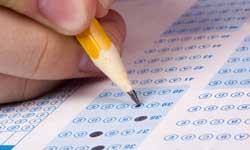As end of year exams approach, Charles Sturt University (CSU) experts are encouraging high school and university students to prioritise their mental and physical health.
 Dr
Fredrik Velander, a mental health expert from CSU's School of Humanities and Social
Sciences,
and Dr Marissa Samuelson, a nutrition and dietetics expert from the School of Dentistry
and Health Sciences,
are encouraging students to keep balance and health in their lives during times
of stress.
Dr
Fredrik Velander, a mental health expert from CSU's School of Humanities and Social
Sciences,
and Dr Marissa Samuelson, a nutrition and dietetics expert from the School of Dentistry
and Health Sciences,
are encouraging students to keep balance and health in their lives during times
of stress.
"Studying for a major test is a time when you can feel overwhelmed with stress and anxiety, and you can really question the meaning of things," Dr Velander said.
"This is a good time to start using the 'self-care' technique. Self-care is positive self-talk and removal of personal put-downs in your thinking. If you don't get the top score that doesn't mean you are worthless it only means that you have more to learn and learning is something you do your entire life."
Dr Velander's top tips for regaining mental wellbeing in times of stress include:
- Structure your time and make a list of priorities
- Break your time up in to productive periods to remain focused
- Make time to exercise outside to reduce stress and help beat depression
- Keep balance in your life by maintaining a hobby
- Sleep well, go to bed at the same time each night and remember quality is more important than quantity
"If you are finding it difficult to sleep, begin to loose appetite, aren't finding things enjoyable any more, find it difficult to focus on your studies or feel very anxious as soon as you think about the exams you should reach out to your parents, friends, a teacher or a counsellor," Dr Velander said.
"These can be warning signs of depression which is a very common condition in Australia, in fact one in four Australians will experience depression sometime in their lives. It's nothing to be embarrassed about and students should be encouraged to reach out for help."
Dr Samuelson is encouraging students to keep a balanced diet and eat regularly.
"To keep your brain working as well as it can, you should be eating regular meals throughout the day and should never skip breakfast," Dr Samuelson said.
"Glucose is fuel for the brain so you should be looking to consume good quality carbohydrates in each meal like porridge, brown rice, wholegrain bread, fruit, veggies, legumes, milk and yoghurt.
"If you're feeling stressed, reach for your walking shoes not the lolly jar. Highly processed foods and drinks like lollies, chocolate and soft drink will just leave you feeling flat and lethargic.
"Dehydration will leave you feeling sluggish and tired so remember to drink lots of water. Steer clear of energy drinks and caffeine as they can lead to irritability, difficulty concentrating, poor sleep and anxiety."
For more dietary advice, students can visit the Australian Dietary Guidelines website. For support and mental health advice, students can contact Headspace online or over the phone 1800 650 890.





Social
Explore the world of social